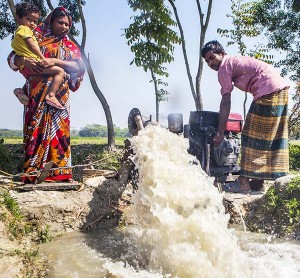Research Highlights Solutions for Groundwater Management in Bangladesh

A recent research report ‘Groundwater Management in Bangladesh: An Analysis of Problems and Opportunities’, published by the USAID Feed the Future Funded Cereal Systems Initiative for South Asia – Mechanization and Irrigation (CSISA-MI) project, highlights that the policy focus in Bangladesh so far has been largely on ‘resource development’ and not sufficiently on ‘resource management.’ This has resulted in drawdown of aquifers in intensively irrigated areas and high expenditure on subsidies to support the energy costs of pumping water for dry season irrigation. Unless water use efficiency practices and policies are adapted and adopted, these challenges in groundwater irrigation can become a serious threat to sustain agricultural growth in Bangladesh.
“Dry season rice production using irrigation helped Bangladesh to increase its total rice production from 18 million tons in 1991 to 33.8 million tons in 2013. However, this dramatic increase in rice production comes with costs – namely the high energy requirements needed to extract groundwater by pumps, which is a concern giving mounting fuel and electricity prices in South Asia” said Timothy Krupnik, CIMMYT Agronomist and co-author in this study.
Diesel pumps consume about 4.6 billion litres of diesel every year to pump groundwater for dry season rice production, costing USD 4.0 billion. This cost is in addition to USD 1.4 billion of yearly energy subsidies supplied by the Government of Bangladesh (GoB) to maintain groundwater irrigation. Such considerable investments add to the energy cost burden, and may not be financially sustainable in the long-term, the report says. This conclusion is underscored by the GoB’s interest to reduce energy subsidies and shift from ground to surface water irrigation, which is energy-wise less expensive.
The report highlights several supply- and demand-side solutions for sustainable groundwater management. Improving water use efficiencies through the adoption of resource conserving crop management practices such as direct-seeded rice and bed planting could help in reducing groundwater demand for agriculture. In surface water irrigated areas, use of more fuel efficient axial flow pumps that the CSISA-MI project is working with the private sector to scale out, is also crucial.
Water demand for irrigation can also be reduced by rationalizing cropping patterns – specifically by shifting from rice to more profitable crops like maize, and to other food security cereals like rice, in areas where groundwater is a concern. Involvement of water users, investments in improved water and agricultural technologies, and providing extra support for farmers making transition to less water demanding crops is needed.
Since the concept of ‘more water-more yield’ is still prevalent among farmers, the report also highlights the need for policy to focus more on awareness raising through educational programs aimed at wise water use and volumetric water pricing. In addition to technical solutions, strong linkages and improved communications between different organizations involved in the management of groundwater resources will also be required to shift to a more water productive, and less costly, agricultural production system in Bangladesh.
This article is authored by Anuradha Dhar, Communications Specialist, CSISA.
Tags: AFP, Bangladesh, CSISA-MI, Groundwater, Research
